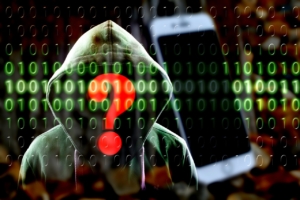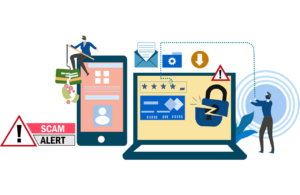‘Tis the Season to Be Mindful
Don’t Wind Up on a Cyber Criminal’s Nice List
Amid the December maelstrom of planning, parties, shopping and activities lie more opportunities for cyber criminals than any other time of the year. The Grinches running scams like the holidays a lot because they know you have an above-average number of emails and online purchases flying around, because your schedule is packed and because there’s a greater level of personal activity around your workplace and your home. These are ripe conditions for your vigilance to slip, giving cyber criminals the opportunity they need to steal your money, your identity or business data.
 Celebrate and savor the season, but keep these tips for cyber security in mind while you do.
Celebrate and savor the season, but keep these tips for cyber security in mind while you do.
Thwarting Cyber Criminals at Home
- Never Click on Email Links. Bogus links in spoofed emails are a favorite tactic for cyber criminals at the holidays. Chances are you are ordering more things online. You may be expecting statements or shipping details. You get an email in the evening, claiming to be from Amazon or UPS, and click on the link without thinking. At best, you get scammed for a few hundred dollars. At worst, you compromise your identity or allow a cyber criminal to install malware on your device. Always go to a website via a browser, not an email link, to verify order and shipping details. If you get a tracking number via email, copy it, go to the shipper’s website, and paste it into their package tracker. That will identify any attempts to trick you with phony shipping. You should also read up on a new scam targeting Pay Later users.
- Leave your devices home for the holidays. If you plan to travel, or your holiday involves overnights at a hotel, a motel or a friend or family member’s home, leave every device with sensitive information at your home. You should never connect your devices to a public network at a hotel or someone else’s home. You have no way of knowing who else is connected, or if the connection is encrypted and secured
- Don’t let guests connect to your home network. This one is tough if you have friends or relatives staying with you, but you simply cannot allow guests in your home to access your Wi-Fi or wired home network. Familiar fraud is one consequence of too much generosity with your home password. You also run the risk of malware from a guest’s device infecting your network, either when they first log in or while they surf the web. If your guests must have access to email or the daily crossword, provide a device for them in a busy part of your home. Make sure that device has a password-protected login, and be sure to turn it off at night and when a majority of people are out.
- Scan those tech gifts before you connect them. New phones, laptops, tablets and all USB devices should get an offline antivirus scan before they go online with your network. Be very wary of any USB memory stick or card given as a gift or brought by a well-meaning friend or relative, as malware infections on these devices are increasingly common.
- Turn off Bluetooth and Wi-Fi discovery on your phone. Big holiday crowds at malls, airports and transit hubs attract cyber criminals, who blend quietly into the crowd looking for data to steal. Open Bluetooth connections and devices seeking Wi-Fi can wind up connecting to criminals with significant consequences. Bluetooth should always be off unless you have a specific need for it. Wi-Fi should be off in general unless you are on a trusted network at home or a secured connection at work.
Protect Against Cyber Criminals at Work
- Never bring devices to the holiday party. Hats and coats aren’t the only things that disappear when the staff gathers to toast the year. Laptops loaded with customer data have disappeared from cabs and cloakrooms, leading to potential data breaches, expensive customer notification and monitoring campaigns and cyber security headaches.
- Log off devices ahead of office parties. It can be tempting to hop up and run to say hello to a visiting co-worker or client, or to work right up to the start of a conference-room celebration, but that open device is an invitation to criminal activity. Always log out of devices before leaving your work area and power them off if you can. Threats to data and passwords can come from criminals who sneak into buildings, from visiting clients or from fellow employees.
- Don’t hold the door for strangers. “Tailgating” is a tactic used by criminals to gain entrance to a secure area. These thieves will ask someone to hold the door, or try to slip in behind an employee before a door closes. During the holidays, tailgaters may pose as delivery people to access secure areas. Whenever you encounter someone you do not know at a door, bring them to the reception area.
- Give your work devices a holiday break. Avoid traveling with work devices. If you must, leave them turned off and packed in a carry-on bag, never with luggage that will be checked. The best practice is to keep work devices at work during a vacation. The chances of device theft, information theft or malware attacks rise when you are away from the secure environment of your office.
- Avoid shopping on work devices. It can be convenient to shop from and ship to the office, particularly if you’re trying to keep a gift a surprise or if your neighborhood is prone to porch piracy. Remember that cyber criminals use fake invoices, fake shipping notices and fake order updates, along with the usual assortment of fake gift card offers, to try and steal your personal information and login credentials. It can be challenging enough to spot the scams in your personal email account without adding that burden to your work emails. If your company allows it, shipping to your office is a good holiday option, but always order using your personal email.
Wherever the holidays find you, remember that cyber criminals are also hoping to find you. Trust your instincts. If something seems off to you, like a long-lost “friend” who starts sending holiday greetings via social media, or an email stating you missed a package delivery, find ways to verify without directly interacting with those emails, private messages or texts.
Personal security and device security are critical components of cyber security. Protect Now helps businesses and organizations manage cyber threats by making security personal to every individual. Contact us online to learn more about our services, including Virtual CISO, Dark Web Monitoring and cyber awareness training, or call us at 1-800-658-8311.

 It’s time for that thinking to change. In its
It’s time for that thinking to change. In its  Martina Dove, Ph.D., is a senior UX researcher at Tripwire and an expert in fraud psychology. Her research into the brain’s reaction to cyber scams and how the human mind operates when presented with a scam makes for an interesting read. On top of this, it also takes a look at fraud, and how susceptible we are to it, and it does this by using Dove’s own model.
Martina Dove, Ph.D., is a senior UX researcher at Tripwire and an expert in fraud psychology. Her research into the brain’s reaction to cyber scams and how the human mind operates when presented with a scam makes for an interesting read. On top of this, it also takes a look at fraud, and how susceptible we are to it, and it does this by using Dove’s own model.


 This is only one of the things that we are going to be facing in the upcoming year. Here are some more that everyone should be aware of:
This is only one of the things that we are going to be facing in the upcoming year. Here are some more that everyone should be aware of: The data from this survey stress how important it is to implement some type of cyber protection strategy for a business, which includes backing up data several times a day, and using the 3-2-1 backup rule. This is creating three copies of your data (a single primary copy and two backups), storing your copied on two different types of storage option, and then storing one of the copies in the cloud or remotely.
The data from this survey stress how important it is to implement some type of cyber protection strategy for a business, which includes backing up data several times a day, and using the 3-2-1 backup rule. This is creating three copies of your data (a single primary copy and two backups), storing your copied on two different types of storage option, and then storing one of the copies in the cloud or remotely. One huge part of avoiding scams and fraud is to recognize well, scams and fraud. And that also means recognizing disinformation campaign’s.
One huge part of avoiding scams and fraud is to recognize well, scams and fraud. And that also means recognizing disinformation campaign’s.























